Your Name: Finding Love Across Possible Worlds?
The premise of the anime feature film Your Name (2016) is simple enough. A love story between two worlds, one involving a disaster and a switch back and forth between worlds with the prospect of preventing the death of one of the two characters. In one world – the events have already happened, wherein the other – they are about to happen. Both characters switch back and forth in their sleep to the body of the other character.
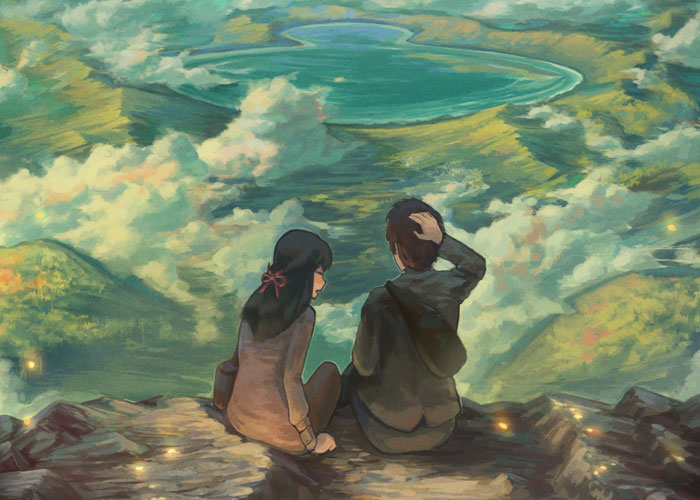
Time-traveling movies like The Girl Who Leapt Through Time (2006) have used a similar dilemma like this before. Traveling time to change the events of the past. But Your Name does not get caught up in the ‘grandfather paradox’ like consequences of this. Instead, it skips over that problem, although taking the concept of changing events a step further. In certain respects, this movie represents the next natural step.
With that being said, a lot of dispute rests over whether this movie makes sense. The concept of possible worlds is not new to academics, particularly philosophers. David Lewis (1986) discusses their ramifications at length on logic which has led others to explore the ramifications of possible worlds. Physicists have also come up with multi-verse theories to pose similar questions. Audiences watch movies expecting a full explanation of how things occurred, happy endings or not.
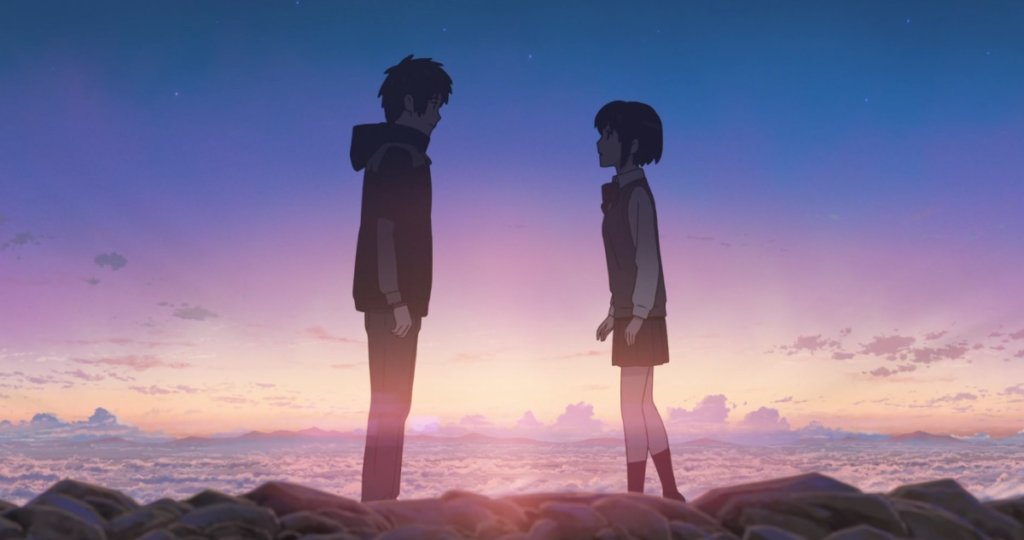
Looking into this love story, and exploring the metaphysics of it all – Does this movie represent an impossible twist, or does that conclusion rest on a miss understanding of what is actually happening in the film? For those of you who have not seen the movie, and already feel I have said too much, this is your point to turn away. Is a love story between different worlds possible?
Back and Forth Between Worlds
During one scene of the movie, the Juliet of this movie named Mitsuha sits alongside her two friends Teshi and Sayaka talking about the day before. Mitsuha finds out that strange things happened the day earlier. She turned up to school in the wrong dress and was behaving like she was not herself. It is here that a clue is laid for the audience to explain the course of events about the take hold. Teshi mentions Everett’s multiverse theory.
Hugh Everett was a physicist who in 1954 came up with an interesting spin-off consequence of quantum mechanics. Each outcome, he proposed, entails a new universe. Each of these co-exists alongside each other and entails some of the strange phenomena linked to causality in particle physics. The idea did not go down well at the time amongst his colleagues. Ultimately, Everett was forced into writing a different version of the idea. Yet interestingly, the application of co-existing worlds wasn’t just seen as a spin-off of particle physics, but also an integral part of possible outcomes each involving possible worlds.
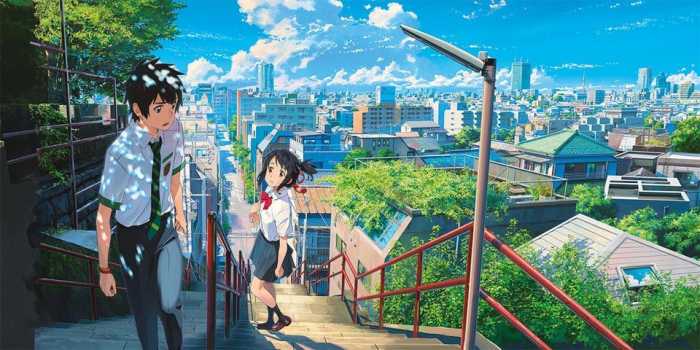
Years later, David Lewis posed an interesting challenge within philosophy to the idea that there is one world. Possible worlds, he suggested, result from different decisions made by the occupants as well as their metaphysical make up and the possible forms of these worlds occupants. For every world to be imagined, there is a possible world that looks exactly like it. However, Lewis considers these worlds separate from each other. Occupants of these worlds are only aware of the existence of these other possible worlds because they imagine them.
When it comes to the twist of Your Name, the Japanese religion Shinto and the supernatural are used to explain how the events of one world on a separate timeline can intertwine with another. Taki and his love interest Mitsuha are not just separated by the fact they are in different worlds. They are also separated by death. When Taki drinks the sake made by Mitsuha this is said to be the point where her spirit meets his and allows for the following scene where the two characters meet at twilight.
That seems the intended use of the spiritual theme of this movie paying off in the twist involving these two characters. Where the consequence of him telling her how to save herself and change her world meaning she goes off to stop the coming disaster from killing her and all the town’s occupants. So what about possible worlds? As well-intentioned as that explanation is, in my view the possible worlds one is actually better by itself without needing the mystical tie in, as beautiful and artful as it is.
The Role of the Red Ribbon
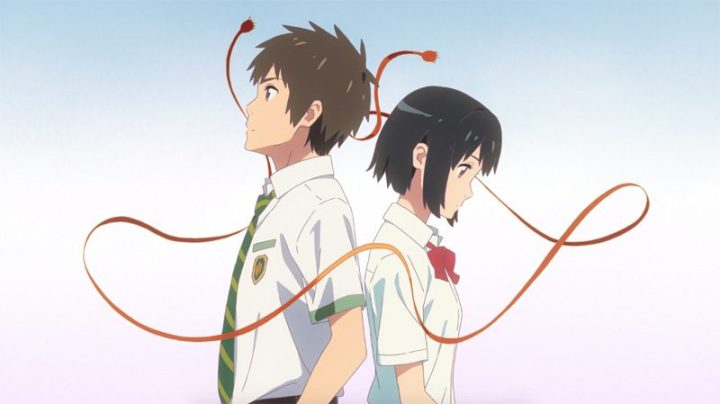
Later on in the film, Mitsuha goes to meet Taki. Catching several trains from her small town in the countryside to the city of Tokyo only to discover that Taki has no idea who she is. Taki asks who she is, and Mitsuha passes him a red ribbon before the train doors were closed. Yet the red ribbon is often used to indicate a stroke of destiny in their interactions. The fact that they meet on a train only reinforces the idea that their tracks are meant to intersect.
People often imagine their ideal partner before meeting them. The features of an imagined perfect partner can at times become what people use to find their actual partners. An Associate Professor at National University of Singapore, Neil Sinhababu explores the connection that possible worlds may well have to finding love across possible worlds in his paper Possible Girls. Not only is this paper brilliant but it raises another possible interpretation of the movie Your Name.
Using the groundwork laid out by Lewis, Sinhababu (2008) points out that if you can imagine your perfect girl, you can also imagine a world in which they receive your message. Imagining a girl in a possible world who imagines you as their perfect guy and the premise that for every possibility there is a world entails some interesting consequences. Why stop there though? If you write notes then imagine them reading it then you can surely write back and forth imagining their reactions and writing it in.
The tie-in with the movie Your Name is that exactly this process is happening through dreams. The messages they imagine for each other are what they end up remembering. In a critical scene in the movie, Taki discovers that Mitsuha is dead as a result of her town being hit by a comet. The messages Mitsuha left on his phone disappear and he is left with the feeling that perhaps he just dreamed all these experiences of being Mitsuha. Perhaps it is this point where he forces himself to go a step further. What if there is a possible world where Mitsuha knew her town was to be destroyed?
No Time Traveling Takes Place
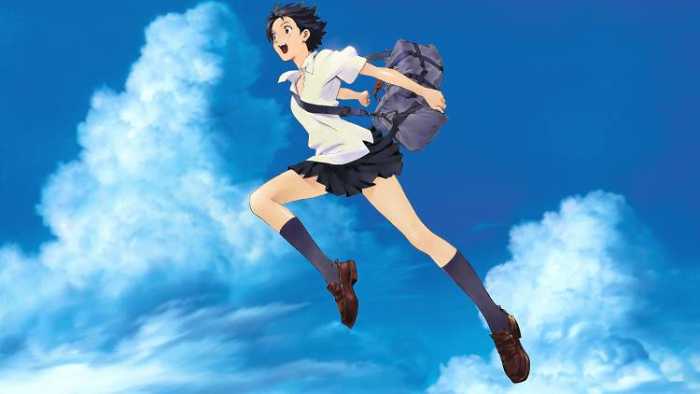
The Girl Who Leapt Through Time is a movie about time traveling, and a really good one. It gets caught up on the puzzle of how time traveling means changing things that have an effect down the line on the present. The lead character travels time to steal food from the fridge only to mean her sister misses out. That happens across the story in different ways.
But Your Name is about finding love, not the consequences of changing things. This is why the possible world’s interpretation is so important. If Your Name does not involve possible worlds, it would entail a loop that Mitsuha and Taki would end up stuck in. If Taki does save Mistusha then he meets her when he travels to her town. The means he does not drink the sake up the mountain and save her. Not every grandfather paradox actually involves a grandfather.
In another paper written by Lewis, another problem looms over Your Name being a time-traveling movie. If the audience wants Mitsuha and Taki to have their happy ending together, one world that has contradictory events would not get you there. Instead, Lewis (1976) solves the grandfather paradox by suggesting that changes in events as a result of time mean the creation of a new possible world. This avoids the contradiction and the loop where events are done only to be undone. That would be really deflating for the audience invested in wanting Mitsuha and Taki together in the end.
The Girl Who Leapt Through Time does have themes involving love, but that is not the main theme like it is with Your Name. Hence why Your Name is the next step alone rather than just a repeat of things done elsewhere. What separates Your Name from time-traveling movies is that it does not want to tie the audience in a knot with the story. It wants to create suspense by leaving the audience with the sense that actually maybe things will not work out in the end for Mitsuha and Taki. That brings the audience to the edge of their seat in a way that is really clever.
More Than Just a Dream
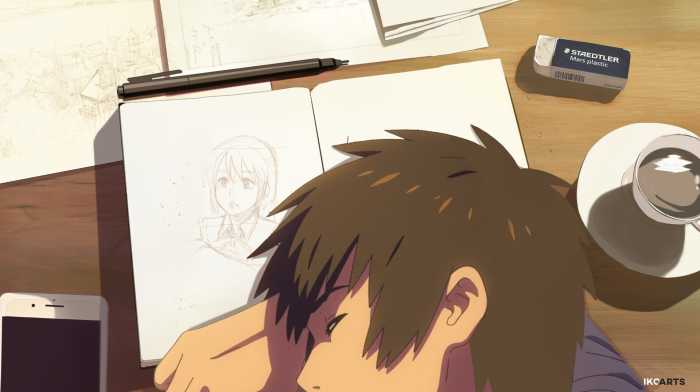
Mitsuha and Taki are dreaming about possible worlds. When Taki falls asleep only to have an experience in Mitsuha’s body in her small town, he has traveled to another possible world. But the thing about possible worlds is that they do not always end up necessarily being different from our own. The thing that makes a possible world different from the actual is really that the actual is the one that you happen to live in. Possible worlds can turn out to be the actual world when they involve future events.
Taki wants to meet Mitsuha so badly, and visa versa, that they both bring that experience into reality. It just so happens that there is a world where Mitsuha learned about her town being destroyed through her obsession with Taki rather than actually learning it from Taki. The movie is actually set in two possible worlds and broken between them. One where Taki meets Mitsuha only to go on and die and one where Mitsuha happened to survive the disaster that struck her town and go on to meet Taki at the end of the film. There was already a warning about spoilers.
That should not leave one with a deflated sense that the events of this movie were just a dream. Instead, the final encounter between these characters is rather one of circumstantial love. Both characters have been dreaming about each other all along, thinking that neither was actually in their world. But the final scene changes all that. As it just so happens that the person they have been thinking about or dreaming about in this case, also lives in their actual world. Finding love across possible worlds is possible.
But for this interpretation to work, a few things have to be overlooked. In particular, the fact that they recognize each other at certain points and have met out of circumstance. Whilst the twilight scene does also present a problem, it does seem to represent a dream. The two points in the film where the characters meet are the ribbon scene on the train in the beginning and the end outside the railway station.
Mitsuha’s and Taki’s dreams being of people who live in their world does not change that they are only dreams. Perhaps Mitusha and Taki know each other from before the train red ribbon scene and their dreams are a play on memories from their subconscious. The marks left on their hands were made by them. Perhaps the wonder built into this film is the result of what we are not shown in the film rather than what we are shown.
Excuse me, What is your Name?
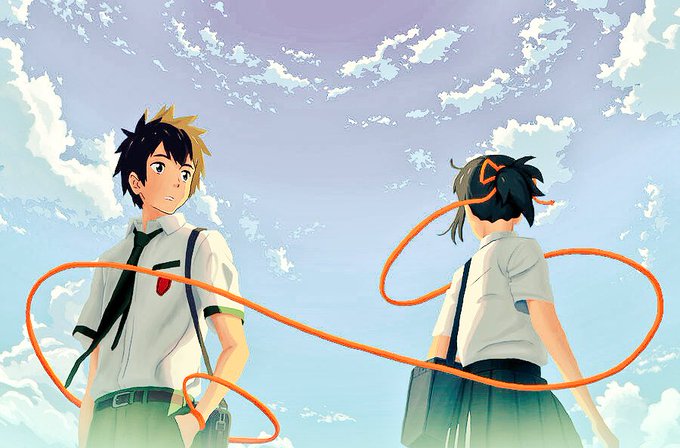
People have pointed out problems with this movie. Outside of Shinto and the supernatural, the explanation of this movie does not work. Although the movie has been widely seen by audiences both in and outside of Japan, people have been still left wondering exactly how it all worked. Although some will scoff at the idea that another explanation is required, actually an explanation that uses possible worlds has a lot to offer.
For some people, explanations involving religion do not work. Some of the scenes of this movie force more of a buy-in to the mysterious results of the spiritual and supernatural world than some are willing to make. For them, the movie can come off as a bit strange even if you do want to see the two main characters find each other. Each to their own, but even if that is how one thinks, that should not make this movie anything less than great. That aspect can be overlooked.
We all long for that special person as Taki and Mitsuha do. Dreaming of someone that one has a crush on, wishing that one could be with a person for longer when death takes them away. This is a normal experience. That is what makes this movie special. It plays on the sense that love can be found in places people do not expect to find it. It also plays on how people find themselves connected in different ways.
Close to the end of the movie, Taki is given the chance to write on the hand of Mitsuha. She wakes up with the message on her hand. Had there been a chance that she knew then she would have written his name. But knowing that writing ‘I love you’ was more important, she chose to write that as his message instead. So that Mitsuha knew that, whatever was about to happen next. Is love between worlds possible? Yes, it is.
Works cited
Everett, H. (1957). The Many-Worlds Interpretation of Quantum Mechanics. (Doctoral Dissertation) Princeton University. Retrieved from: https://www.p bs.org/wgbh/n ova/manyworlds/pdf/dissertation.pdf
Hooper, R. (2014 September 24) The Man Who Gave Us the Multiverse. New Scientist. Retrieved from: https://www.newscientist.com/article/dn26261-hugh-everett-the-man-who-gave-us-the-multiverse/
Lewis, D. (1986). On the Plurality of Worlds. Blackwell: Oxford
Lewis, D. (1976). The Paradoxes of Time Travel. American Philosophical Quarterly 13(2), 145-152. DOI:10.1093/0195036468.003.0003
Sinhababu, N. (2008). Possible girls. Pacific Philosophical Quarterly, 89(2), 254-260. https://doi.org/10.1111/j.1468-0114.2008.00319.x
What do you think? Leave a comment.








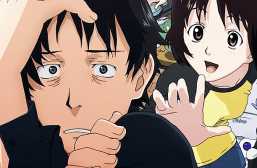

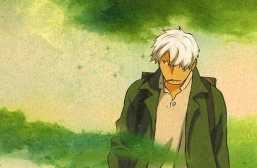
I still frequently keep thinking of how much the film moved me emotionally. The body swapping plot device not only gives the two leads perspective on each other’s individual lives but on a much larger scale the differences and similarities between Old Japan and New Japan.
I watched Eternal Sunshine of the Spotless mind and Arrival on the same night.
I just wanted to be alone staring into infinity, pondering the decisions I would make in the characters shoes.
The fact that the true significance of the scene at the beginning of the film only get revealed at the very end was amazing. That’s how you foreshadow
What’s crazy is that in that opening sequence the major twists of the movie are basically all spoiled. Yet it works cause Shinkai is throwing so much at you that you forget about a lot of it until he reminds you of it later on.
Yup. I rewatched it last month with friends (their first time, my second) and my jaw dropped at the opening scenes. Had totally forgotten how early he dropped that info. I looked at my friends, worried something had been spoiled, but they clearly didn’t pick up on any of it.
It might not be perfect but to me it’s the closest an anime film has gotten to it soo far. Sure I would have liked to see their love actually develop more during the film, a hug during Kataware-doki would have propably fitted well enough and more of Mitsuha’s post comet life but all in all, if perfection doesn’t exist, this one got it pretty close for me.
I think my issue with Shinkai is his over reliance on internal dialogue. Sometimes it works really well, but at other times I feel he should show rather than tell. Interesting that his manga version of 5 cms per second is more satisfying, and I wonder whether some of that is down to the fact that the internal stuff is stripped down to a relative minimum…
Anime at it’s best, as by Miyazaki or some other Ghibli offerings, is utterly wonderful. Without wishing to denigrate Hollywood animation films, I find them interesting, some of them, but never captivating in the way the best anime can be.
This is not a film. It’s a work of art, and I am very, very seldom one to turn to hyperbole with regard to motion pictures.
I think that the music was very out of place and disruptive and also thought that the end was very draggy. I recall watching 5 Centimeters Per Second, one of Shinkai’s previous film, and realising the similarities in the end which bugged me also.
The music was a bit out of place to the rest of the film, but I understand, I think, why he chose to use this type (it is a film about teenagers and the music was reflective of music that teenagers listen to). That said, there is one scene in particular, a quite pivotal part (which I won’t go into as I don’t want to spoil it for others) where it almost ruined the scene (in my opinion) and, if not ruined, certainly became a little annoying.
I think the film shows potential for a new generation of Japanese animators. The narrative is very unique, the art style shows promise for a new kind of aesthetics in anime and the interesting themes.
I think the film represents a problem in Japanese anime right now which is something Miyazaki also elaborated on. Japanese animation is in its own little world of Japanese animation. The film makers are not film makers but Japanese animators first. They confirm to the general anime conventions. It’s a feedback loop. They are inspired by anime and they make anime. This is were Miyazaki was different because he often looked else where for inspiration. He broke the feedback loop. I just feel that if Shinkai is going to prove himself and reach out to audiences outside anime, he has to break the anime conventions and learn to be a film maker.
I think the film was good. The fundamental essence was great but the execution wasn’t good. But it’s a showcase of one of the most promising film makers in Japan and with time, I think he will improve his skills.
I largely agree with a lot of what you say here. I thought the film was excellent and showed that Shinkai has a lot of promise but there is that conformity towards anime trends that, had he broken away from, would have made for a much stronger film.
I thought it was a brilliant film and thoroughly enjoyed it. Having just been in Tokyo a few days ago, it was great to see the detail in which the city was presented as anime on the screen. At times, the artwork is breathtakingly beautiful.
Many of Makoto Shinkai’s works have the same flavour. This movie is probably his best work, but if you’re familiar with his previous outings, you’ll definitely have a feeling of familiarity with this. This was probably his ‘happiest’ work to date.
Joss Whedon wrote a screenplay for a lovely little film called In Your Eyes. It’s not a body swap, but a man and a woman divided by thousands of miles, in very different personal situations, can see through each others eyes and hear too. I know it’s not the same, but I thought of that film as soon as I started reading about Your Name
An incredible movie. I have not cared so much for a cast of characters in quite a while. It’s a great ride, I laughed plenty, I cried (although it should be said that I often cry with films) and i felt the leads desire and hope. It is a beautiful film in every sense.
Enjoyed the movie, don’t think I could watch it again though, was quite melancholic most of the time and relieved with the ending.
His film seems to really show Shinkai moving up a level in his story telling prowess; where his previous films are undeniably beautiful and compelling (apart from Agartha, which just didn’t quite do it for me), they remained quite rooted in his extended use of internal dialogue, whereas Your Name just seemed to explode from the screen in its characterisations. I loved it and can’t wait to see it again.
I was a Shinkai fan already after having seen Byousoku 5cm, but Your Name was an absolute masterpiece. A grown 30 year old man should not feel the feels I felt. It was an absolute ride up until the last four words.
It really captures that fleeting and intangible feeling of dreams. It’s there and not quite there.
Loved it.
His movies are aesthetically brilliant – the pinnacle of animation art – but the plots lack depth and universal appeal. I could never get into them as much as I could into any Miyazaki or Takahata. But Your Name is the exception.
Saw the movie today and I heard it was good but it even exceeded my expectations. Such a beautiful, romantic but also sad movie. Loved the relationship between all the characters and the plottwist in the middle hit me hard. Thankfully we got a happy ending.
I love how their final words were “Tell me your name”. Prefectly relates to the title of the movie and it was a powerful scene to end the movie.
Yeah, that ending was amazing IMO
I literally just finished watched it for the first time 15 mins ago after surprisingly not hearing much of anything about this movie at all until about a week ago and I think it kinda deserves the hype. Like, that was a good movie! I knew absolutly nothing about it other than that it was a love story going into it, and god damn was that a trip!
I think Shinkai Makoto finds it difficult to add lots of meaning into a movie, like for example in his most recent movie ‘Weathering With You’, it felt like the plot was driven just to push the movie’s message across to the audience. As a result, the plot felt a little forced and kind of broken.
This is mine and my brother’s (whom i served in the military with) and his family’s movie that keep us connected even when we’re hundreds of miles apart.
The fact that the film could’ve ended at any time during the last 20 minutes had me on the edge of my seat.
Before this movie, I watched another of the director’s films which has a similar type of setup for an excruciating ending, and I was so extremely stressed out about whether he’d really rip my heart out again.
For anyone who has seen Kotonoha no Niwa/Garden of Words, Mitsuha’s Literature teacher is the same character from that movie.
Also the name of the Italian restaurant Taki works at, “Il giardino delle parole”, translates as Garden of Words
Reminder that when they were swapping they were basically dreaming so its hard for them to remember details of their memories during the swap. This movie give the feeling of longing for something , like when you are sleeping and having a really good dream only ended up to wake up and forgetting about it.
That was maybe what I liked most about the movie. I don’t think I’ve ever seen any other film deal with the whole “trying to remember a dream after waking up” thing and the way this film handled it in such a sentimental and longing way really moved me a lot, and went beautifully with the lost love themes of the story.
It’s been a long time since a twist got me, but that one in the middle of the movie was very well done.
It’s strange because seeing it a second time I was like “How did I not see this foreshadowed and that foreshadowed?”
So many things that could have tipped off other events later on but you just don’t catch them until you go back. The film was amazing, and my appreciation only grows on subsequent viewings when I can see the setups that weren’t necessary to understand at the time but are a pleasant surprise when you do notice them.
This is a fascinating article for an anime rookie like me. I’ve only just gotten into anime with The Blood of Zeus but thats because of the mythology links in it.
Reading this article, as well as several others, about Japanese anime, I find it interesting how intricate and detailed they are regarding story development. Obviously, in Japan there must be a big following and I realize there is some level of following in the United States–my daughters use to have a number of these books when they were younger. You might want to consider an article that addresses more than just a particular story but a broader way of looking at how this category of novels/animation (not always sure what to categorize it as) is received: 1) contrasting its acceptance in the United States versus Japan; 2) any evolution over the years or are current ones similar to the ones twenty years ago (when my daughters read these), and; 3) its persistence or “staying power.” An outgrowth of #2 is: Are there adults who read them when they were young who are a big part of this market or is his something young readers grow out of? A good essay, by the way.
I loved the subtle mannerisms.
One thing that’s stayed with me is (I saw the dubbed version) how the characters changed when in body-swap mode – especially when Mitsuha was in Taki’s body.
It’s telling that he went into animation from video game graphic design.
This movie is an emotional masterpiece.
Movies like these is why I still prefer hand drawn animation over completely cgi. breathtaking visuals
This is the same reason why I prefer Japanese animation instead Disney and Pixar.
I think this will be long remembered as a classic anime
I watched ‘Your Name’ such a long time ago and also had a similar question, “Can love be found in the most unexpected places even if it seems impossible?” After reading this article, I am definitely sold on the idea that there may actually be other worlds and that love can be more than just objective. There were some parts that were kind of hard to read in the article though, probably because of typos, but overall, I really enjoyed reading this along with experts theories as well as the writer’s theories on the film. There will always be people who will criticise ‘Your Name’ because “it doesn’t make sense” or “it’s not realistic” because they will never try to understand it and the meaning behind the film but as someone who has a deep love for anime from such young age to now, the change in animation and story lines in anime these days is truly fascinating and I look forward to the future of anime.
Makoto Shinkai’s films never fail to move me. As you mention, it’s nice to see a “time-hopping” movie that doesn’t get overly caught up in the hard science of potential butterfly effects, etc. Makoto Shinkai’s films are usually deeply rooted in and focused on the complexities of relationships and this film is no different in its thematic explorations.
Want to watch this movie.
Just wanna tell that this is very beneficial, Thanks for taking your time to write this.
I am seeing a mish-mash of various concepts and religious and cultural concepts blended together in this anime. Thanks for highlighting this.
This movie moved me in a lot of ways – not the least of which was the ending. The need for an explanation has honestly never occurred to me, and I never considered it would take place in multiple worlds; the paradox that seems evident now completely went over my head the many times I’ve watched it. A fascinating read. Will have to watch it again!
This is a really well-written article! Your Name is one of my favorite films, and your analysis of both the supernatural elements and the philosophical points are fascinating. What a fantastic read!
That was a great piece. The underlying philosophical premises are so finely
interweaved into the narrative that it comes alive into the fore as the movie
unravels.
It captures the artistic genius of Makoto Shinkai, one of his many remarkably impressive works capturing and enlivening the subtle and deep psychological and philosophical themes— Garden of words, Weathering with you, 5cm per Second, and many more.
let’s all just agree that kimi no nawa is one of the best romance films ever made
I watched this after finishing 5 centimetres per second and boy, I would say this is one of its kind in romance genre if you leave the storyline and some hidden explanations.
I think the wrong question is being asked in this article. Whether or not the love story is actually possible misses the point of the movie. Makoto Shinkai created ‘Your Name’ as a way to create something meaningful and healing in the face of disaster (2011 Tohoku earthquake).